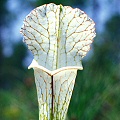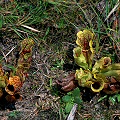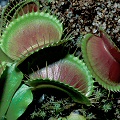Q: Where do plants being sold in stores come from?

Sarracenia leucophylla

Sarracenia purpurea

Dionaea muscipula
A: It depends a little on the venue. Most of the carnivorous plants that I see in stores in the USA
are sundews (usually Drosera capensis),
Venus flytraps (Dionaea muscipula), and cobra lilies
(Darlingtonia californica).
The sundews are South African, and reproduce so rapidly by
seed or tissue culture, they are clearly propagated artificially (and legally).
The Venus flytrap clones are also
almost certainly from tissue culture. I can say this because over the last several years I have noticed a subtle shift in
the retail Venus flytraps---most are specimens of a cultivar called Dionaea 'Dentate Traps.' Clearly
these are plants of horticultural origin.
The fact that Darlingtonia californica plants are sold in stores is an embarrassment
to the nursery trade. These plants are extremely difficult to grow; the only reason you can get them in stores is
that they reproduce well in tissue culture. All those plants in the stores are destined to slowly die within several months.
How can these horticulture companies make money, knowing they are only selling disappointment?
But all the previous is just related to the plants I see in California. I understand that there is still a vigorous trade
in illegally collected Venus flytraps, even though
there are stiff fines for field collection in North Carolina. Some of these stores
are suppliers for overseas nursery operations.
Because of perceived medicinal values of pitcher plants (Sarracenia), truckloads
are taken from the
wild and shipped to pharmaceutical firms in Europe. I do not know of any verified value to the
compounds being extracted from the plants. Fortunately, no one has decided these plants have any
aphrodisiac values, otherwise the collections pressures would mount
even higher. Thank the Powers That Be for ensuring Viagra does not derive its
efficacy from any of the other erect trumpet pitchers.
The plant sources that I recommend may have plants that are
expensive, but they do not field collect their stock. I have no tolerance for those engaged in
field collection for profit.
Page citations: Personal observations; reader contributions.